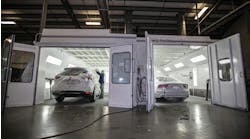To distinguish one’s self in the aftermarket nowadays is difficult, but the National Pronto Association appears to have this problem licked.
A program group that serves independent distributors, retailers and service centers, Pronto has a growing roster to prove itself; more than 10 new members were signed up in 2004, and more “organic growth” is in store for the new year, says President Bill Maggs.
“If you look at the competitors, we’re at the top tier,” says Maggs. “Our members are a great group of folks to work for.”
He attributes a number of reasons for the group’s membership surge, one being the hiring of Murray Sullivan, Pronto’s director of business development who has focused solely on membership.
The group also offers a unique array of incentives, like parts and labor warranties, and a recently launched vendor program that issues a roadside assistance certificate to the service center customer. The certificate, says Maggs, offers the driver a free tow or jumpstart if the vehicle breaks down, which can increase the likelihood of repeat business at members’ service centers.
On the technology end, Pronto offers an Extranet, loaded with free information for shareholders, and is in the process of creating a data warehouse to help members better manage inventories.
Perhaps the most important aspect of Pronto is that it’s “customer focused,” with an accessible headquarters, shares Maggs, who adds that a person will always answer the phone at Pronto, as opposed to automated answering services that may be found within other organizations.
Some companies can become top-heavy, with too many administrators at the highest rungs of the ladder, but Pronto prides itself on being “lean and mean” at the headquarter level, he adds.
Growth has not always been Pronto’s strategy. A few years ago, the organization reduced its numbers intentionally.
“It was a purposeful strategy,” admits Maggs. “Back in the ’80s, there really was no requirement to belong to a group. We instituted some compliance rules in the late ’90s, but at the same time we had people who were members but really weren’t participating.”
Pronto went on to employ a “minimum allowance program,” wherein those who bought from the product lines would not have to pay, but those who did not actively participate were charged allowances. The result strengthened the group’s remaining members, but, sadly, left some friends behind, says Maggs.
Pronto still has some criteria for membership. For example, “we don’t really go to startups,” he says, adding companies should already be handling substantial volumes to join.
With 49 shareholders who represent 93 distribution centers, Pronto is a shareholder owned and driven association, Maggs says. “The decisions on our marketing and product lines actually do resonate from our board of directors.” The program group’s focus on people is evident with Maggs’ reflection on the day-to-day: “It’s fun coming to work every day.”



